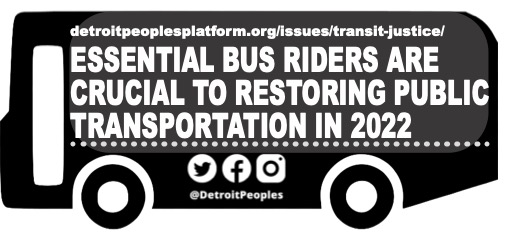Essential Bus Riders are Crucial to Restoring Public Transportation in 2022
From the 2022 Martin Luther King Day edition of the Detroit People's Platform NEWS.
The year 2021 may be a year marked by efforts to recover the economy from the damaging effects of the covid pandemic. Congressional passage of American Rescue Plan Act (ARP) and Infrastructure Job Act, provided historical increases in federal investment for cities, states, and educational institutions, and direct aid for impacted families and individuals. Essential bus riders including paratransit riders, individuals that cannot use traditional bus service, and require federally-funded and specialized transit vehicles, are in need and require special attention for pandemic recovery efforts.
Instead of providing a platform for residents and essential riders to provide input on how American Rescue Plan (ARP) dollars should be spent, the Detroit Department of Transportation (DDOT) resumed collecting bus fares in March 2021. Further, DDOT failed to publish an equity analysis detailing the likely impact on DDOT ridership – a ridership that largely includes essential workers who cannot work from home. These workers rely on transit to access critical jobs like health and medica aids, home-visit caregivers, grocery-store workers, individuals working in manufacturing, construction, public works, and restaurant workers. – all of whom are essential to economic recovery yet face the greatest risk to covid exposure and illness.
In November 2021, DDOT drastically cut bus service to 18 routes, slowing down bus service to every 20 minutes on some routes, and 30 minutes to an hour on many neighborhood routes: one-bus-per-hour service on weekends and ending 24-hour bus service on main routes like the Vernor #1, Michigan #2, and Jefferson #9 from 1am to 3am. DDOT also eliminated the 100 years old service on the Clairmount #11 route, along with a recently created connector-route in Southwest Detroit – the Junction #26, and the Tireman #47. Bus riders did not have adequate warning nor reasonable opportunities for public input about these changes.
DDOT also failed in committing to report on efforts to reform paratransit service. Bus riders who depend on para transit have been calling for a review of public-private control of operations, customer service, and vehicle dispatch - all of which are currently managed by a French owned company, TransDev. The privatizing of vital services such as para transit leaves the fate of thousands of Detroit disabled and elderly in the hands of decision makers with little of no direct accountability to Detroit residents.
In spite of these challenges, the Transit Justice Team were able to continue to organize essential riders on actions in response to service changes, turnout to DDOT monthly community virtual meetings, rally support around proposed DDOT Passenger Bill of Rights; and garner traditional media coverage highlighting the priorities and demands of essential bus riders in Detroit.
Members of the transit justice team successfully organized and won inclusion of recommendations from essential riders in the final revised city charter document brought forth under Proposal P. Those revisions were intended to expand the power of bus riders and Detroiters by mandating the creation of a new transit advisory board with increased oversight powers related to service planning, transit budgeting, and public input in decision-making. Also, the revisions would have mandated a low-income fare program to provide reduced fares and bus passes for veterans, returning citizens, those who are homeless and low to no-income families and individuals. In addition, the proposed DDOT Passenger Bill of Rights would have established obligations for DDOT towards the ridership ensuring equity in service investment and access; improved customer centered communications and engagement and better compliance and transparency with the mandates of Title VI in its transit planning.
The transit justice team anticipates that the organizing work in 2022 will provide opportunities for riders to become involved in the decision-making process with how the city will invest public resources in transit including federal American Rescue Plan Act (ARP) funds, the Infrastructure and Jobs Act monies and the upcoming 2022-2023 city budget. These budget decisions will be made under the leadership of the newly elected city council. Essential bus riders must organize and advocate for public transit that centers the priorities and rights of essential bus riders as reflected in the historical positioning of public transit as a civil rights issue and public transit here in Detroit as one of the basic services provided to residents.
The Transit Justice Team is calling all bus riders, Detroit residents, and supporters of essential bus riders to organize for the passage of the DDOT Passenger Bill of Rights in order to create a Low-Income Fare Program, and implement the Transit Justice Team’s ARP Funding Recommendations and Guidelines for DDOT. The DDOT Passenger Bill of Rights implements the following standards for Detroit public transit bus service:
Detroiters should expect the following standards from its public transit service:
- Respectful, courteous service from DDOT personnel
- On-time bus service
- Clean, safe, and well-maintained public transit shelters and transit bus centers
- Receipt of transit information in a timely, transparent, with language accessibility
- Full ADA compliance in regard to access to shelters, transportation stops, and transit centers
- Adequate accommodations for a transit rider’s special and other reasonable needs
- Adequate and multiple means of notification of disruptions and delays in service
- A fare structure that aligns with the income of the majority of the bus riding public
- Multilingual transportation literature, signage and other forms of communication accessible to all citizens
- A fair, impartial, and expeditious process for the filing and resolution of complaints and grievances with the Detroit Department of Transportation (DDOT).
- Essential rider input on operations and service-related decisions to inform planning and implementation.
Finally, sometime in 2022 DDOT will announce dates for public hearings, called “Comprehensive Operation Analysis” which will detail plans to restructure bus service in Detroit. It is important that essential riders, and those who advocate AGAINST further bus cuts to neighborhood routes be present. The voice of essential bus riders is necessary for the restoration of appropriate levels of DDOT service since it is the essential riders who have the daily user expertise and knowledge of how bus service should operate in response to the needs and priorities of its essential riders. Detroiters must pass the DDOT Bill of Rights and thereby restore public transit as an important and basic service.
From the 2022 Martin Luther King Day edition of the Detroit People's Platform NEWS.
People's Platform NEWS 21
Vol. 21, Martin Luther King Day 2022
Contents:
- 2022 and the Shout Out for the Future
- 2021 WINS!
- Essential Bus Riders are Crucial to Restoring Public Transit in 2022
- Reading Between the Lines: Budgeting for Private Developers not for Detroiters
- HOUSING TRUST FUND - A community driven solution to provide homes for all!
- Detroit has a transparency problem because Michigan has a transparency problem
- Beniteau Stellantis CBA Update
- 2022 Detroit City Council Contact Info

